What separates hardcore film aficionados from casual moviegoers, in my humble opinion, is the way they view the world of movies. Casual moviegoers are simply looking for a couple hours of escapist entertainment on a Friday night, but for film fanatics like myself, visiting the local theater is serious business.
Over the years, we develop and refine our tastes in film, ultimately discovering a bit of ourselves in the movies (and filmmakers) we feel most drawn to. In my case, 5 filmmakers in particular have played a significant role in helping me define my interest in film throughout the past decade. They’re my own personal “Usual Suspects” and perhaps the 5 men in film whose careers I follow with the most relish.
Here’s the list (in alphabetical order):
Christopher Nolan
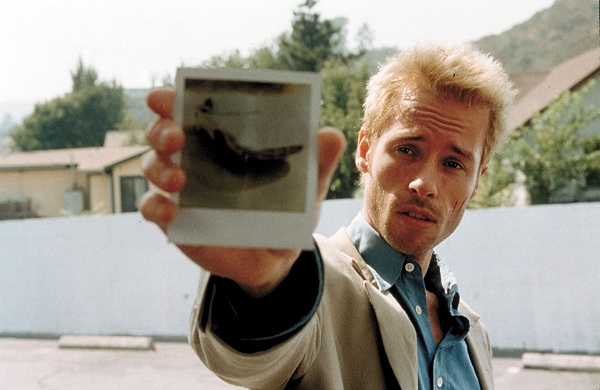
Christopher Nolan exists today as one of the few filmmakers who refuses to acknowledge that he’s making movies in the 21st century. By this, I mean that his films – whether intimate character studies like Memento or sprawling $200 million epics like The Dark Knight Rises – never forget that cinema is a storyteller’s medium, first and foremost.
Visual effects and big-name stars aside, his films achieve a sort of timelessness and cohesiveness that few working in Hollywood today have managed to achieve. It’s no wonder that the writer/director has emerged as one of the most powerful filmmakers working today… and a marquee name himself (take note how prominent the phrase “From the creators of The Dark Knight trilogy” was in the Man of Steel marketing campaign, for instance).
Like many film aficionados, I first came across Nolan when Memento hit home video and was instantly intrigued by its narrative structure. For those who have never seen Memento (and, if you’re a true cinema-phile, you really should), the film centers on Leonard Shelby (Guy Pearce), a man who suffers an unfortunate condition that leaves him without the ability to form new memories. Every few minutes or so, Leonard’s mind essentially wipes itself clean, leaving him helplessly unaware of where he is or what’s going on around him.
In order to help the audience sympathize with Leonard’s situation, the film ingeniously plays with the narrative structure, letting the story play out in reverse order and allowing for multiple shocking reveals and a gut-punch of a conclusion. Yet, despite its dark subject matter (something Nolan has since become known for), Memento manages to sneak in a bit of levity and allows its entire cast to deliver the best performances of their careers.
Of course, Nolan has since become a household name, thanks to his work with a certain Caped Crusader. However, his focused, reverent approach to storytelling has made him that rare example of a post-modern filmmaker working in a classic style. Even at his worst (Personally, I consider Rises a bit of a weak spot on his resume, despite its merits), Nolan always aims for greatness and usually achieves it. Whenever a Nolan film is on the horizon, audiences know that they’re in for something worthwhile.
Robert Rodriguez
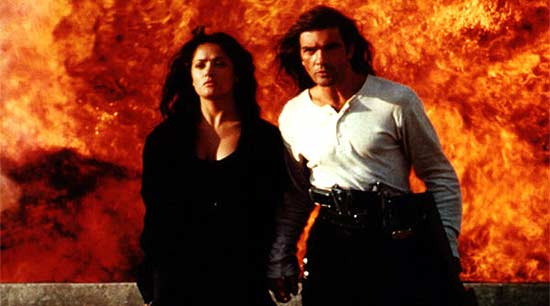
It’s hard to pinpoint precisely when Robert Rodriguez became such an inspirational figure for me, but I’m inclined to say that it all started with Desperado. The 1995 action film starred Antonio Banderas and Salma Hayek at the height of their charms and centered on the character of El Mariachi (Banderas) – a sort of Mexican twist on Sergio Leone’s The Man with No Name – as he sought revenge for his girlfriend’s murder. The film offers a kinetic modern take on the classic Western, and while its storytelling isn’t as solid as that of other filmmakers, Desperado is indicative of the Rodriguez style.
The filmmaker first rose to fame as the man behind indie darling El Mariachi, the $7,000 production which preceded Desperado. Rodriguez raised funding for the film largely by participating in experimental drug testing, and his independent spirit has remained intact throughout his career. In addition to writing and directing, Rodriguez has served as a producer, editor, composer, cinematographer and visual effects supervisor on nearly all his features, including Sin City, Once Upon a Time in Mexico and the Spy Kids series.
For me, this can-do spirit has fostered a more than casual interest in the filmmaking process, buoyed largely by Rodriguez’s “Ten Minute Film School” featurettes on the DVD releases of his films. In these, the filmmaker allows viewers to peek behind the curtain at his process and the studio he’s created for himself within his home in Austin, Texas.
Rodriguez has not only created a career for himself on the silver screen but managed to do so on his own terms. More than that, he has imbued his signature sense of style and his unabashed love of movies in his work, regardless of whether he’s doing a family film or a blood-splattered revenge tale. While not all of his films can be considered gems (The Adventures of Sharkboy and Lavagirl, anyone?), Rodriguez is a filmmaker worthy of praise because, much like a great man once sang, he did it his way.
Kevin Smith
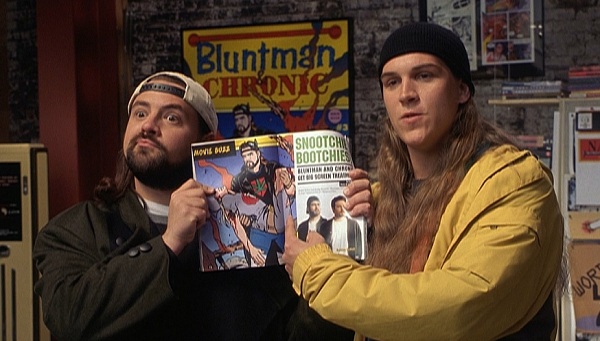
The funny thing about including Kevin Smith on this list is that – unlike the other filmmakers on this list – there isn’t a single film I can attribute to making me a lifelong fan. Rather, my appreciation for the unique voice that is Smith has been a slow burn, an especially appropriate phrase considering that his most famous creation is the stoner duo known as Jay and Silent Bob.
Whereas most Smith devotees probably jumped onboard his View Askeniverse (the interconnected movie universe that includes most of his films – take that, Marvel!) with early entries like Clerks and Mallrats, I first wandered into the Quick Stop with the 2001 release of Jay and Silent Bob Strike Back, during which I was working at a movie theater myself. Both its lowbrow humor and the high-brow, self-aware way in which it was implemented intrigued me, and after Clerks II was released in 2006, I was fully initiated into the Smith brand of comedy. However, while the quick wit of his films had won me over, it’s Smith’s more recent endeavors that have truly transformed him into one of my favorite filmmakers.
Disillusioned with the Hollywood system, Smith has spent the last few years creating an empire of his own with SmodCo, the podcast network that is home to more than 30 shows. Essentially, Smith has found a way to make a living doing what he does best: talking with his friends about movies, current events and anything else he can think of. In addition, he hasn’t left filmmaking behind entirely. Rather, he made the ambitious decision to step outside his comedy comfort zone and toured the country with controversial horror film Red State (a bold move for a filmmaker nearly 20 years into his career) and is working on Clerks III as well as a new film called Tusk, inspired by one of his very own podcasts.
Through it all, Smith makes the continuous effort to connect with fans, whether via his Twitter feed or in person at one of his many (and often sold-out) live appearances. His message to aspiring filmmakers and other artists? Follow your dreams, seize the tools around you and make it happen! Smith has managed to successfully break into independent film and establish himself a pioneer in new media. So any fans who doubt his advice should first consider the source.
Quentin Tarantino
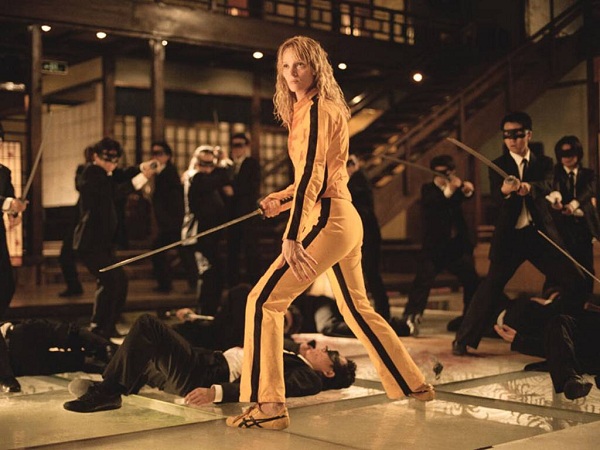
Ever since “Royale with cheese,” the world has been enamored with Quentin Tarantino’s stylized way with words and morally complex characters. Pulp Fiction easily stands as one of the most influential films of the past two decades, but it was Kill Bill, Volume 1 that drew me into his twisted cinematic universe.
The film made three points clear upfront: 1) Tarantino’s shuffled narrative structure, 2) his ear for dialogue and 3) his absolute respect and admiration for cinema history. This is a man who possesses an encyclopedic knowledge of the filmmakers who preceded him, and his hunger to create art that honors his inspirations is evident throughout his career.
The Western meets samurai aesthetic of Kill Bill serves to combine two of the most essential sub-genres of Tarantino’s youth, and similarly, he incorporates homages to classic cinema into virtually every one of his films. His critics have consistently claimed that Tarantino’s filmography is rife with plagiarism and the earmarks of lazy screenwriting, that he leans too heavily on the shoulders of his idols.
However, the difference between Tarantino and other, lesser filmmakers is that his work always does something new with the existing cinematic toolbox. The revisionist history of Inglourious Basterds, the assimiliation of blaxploitation and old-school Western elements in Django Unchained and the heist film without an actual onscreen heist that is Reservoir Dogs… Tarantino doesn’t just reflect back on film history. He advances it, bringing his own voice to the table and, in turn, inspiring the next generation to find theirs.
Try and imagine the current cinematic landscape without Tarantino. You can’t. The filmmaker’s influence is undeniable, and his daring creative choices and legion of adoring fans (among both critics and audiences) have been a direct translation of his passion for film. Tarantino – much like yours truly – has lived the world of film for so long and has been so fueled by its role in his life that it’s all that he can do to get it out of his system and onto the screen. Lucky for us.
Joss Whedon

Truth be told, I initially became a Joss Whedon fan through his stellar television series Buffy the Vampire Slayer. However, now that Whedon is overseeing Phase Two of the Marvel Cinematic Universe (leading up to the 2015 release of The Avengers: Age of Ultron), it seems fair to include him on this list.
Whedon’s talent is a very specific one. More than virtually any other writer/director working today, he has mastered the art of the ensemble cast. As evidenced by the television series he has created, Whedon can balance the dynamics between a large cast of diverse characters like an expert puppetmaster, playfully raising the tension in one moment and delivering a witty one-liner the next.
Never is this skill more evident than in The Avengers (maybe you’ve heard of it?). The Marvel team-up was only the second feature Whedon directed (following his big-screen Firefly adaptation, Serenity), and in lesser hands, the epic meeting of Iron Man, Captain America, Thor and the Hulk would have been a disaster. However, with Whedon at the helm, the film managed to not only satisfy the requirements of a big-budget popcorn flick by delivering the action and spectacle fans expected. It also went the extra mile to address nearly every lingering thread in the five solo films that came before it.
Whedon also deftly developed connections and conflicts between his principal players, developing both the antagonistic relationship between Tony Stark/Iron Man (Robert Downey Jr.) and Steve Rogers/Captain America (Chris Evans) and the budding friendship between Stark and fellow scientist Bruce Banner (Mark Ruffalo). All the while, Whedon devotes just enough screen time to supporting players like Loki (Tom Hiddleston), Black Widow (Scarlett Johansson) and fan favorite Agent Coulson (Clark Gregg) and keeps his signature wit in full effect (Hulk’s Loki-bashing being a standout example).
Take another look at The Avengers (or Serenity, for that matter) and notice just how slickly Whedon manages to fit the endless supply of puzzle pieces into a cohesive, thoroughly entertaining experience, and even with his much-deserved status as a Hollywood power player, Whedon finds the time to direct smaller projects like his recent adaptation of William Shakespeare’s Much Ado about Nothing. The man’s directorial career in film may still be in its early stages, but if his existing films are any indication of his future in the movies, then we’d all be wise to assemble for his next release.
So there you have it: the five filmmakers who have most inspired my ever-growing love of movies and the art of storytelling. Feel free to share your thoughts on my list or share your own favorite filmmakers in the comments section.

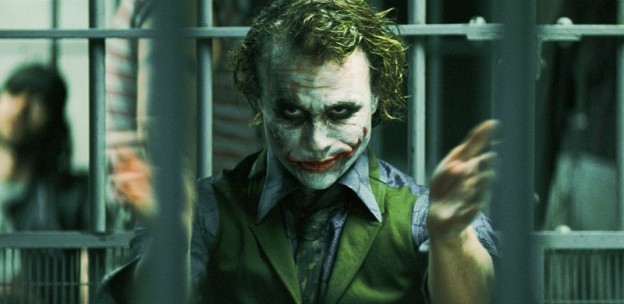
Fantastic! Glad to see your first blog entry is regarding one of the reasons you love films so much.
Wow! What an interesting article- well thought out and written. Keep up the great articles!